Paula Vince's Blog: The Vince Review, page 20
February 20, 2022
Minimalism for Pleasure

The academic year is about to begin, and three of our household will be studying full time. My younger son is off to start his Bachelor of Languages, my husband will be studying a Master of Teaching and I'll be commencing a Master in Creative Writing and Communication. Our new Covid culture is behind my husband's change of direction. He had built up his own business as an entertainer of elderly citizens at nursing homes but because of all the new restrictions, appointments have declined to the point where we can't make ends meet. This coming year will be characterised by tight purse strings, but as our daughter remarked, that's what we've always been used to. Having too much month left at the end of the money has long been a way of life since our three kids were small.
Practising a sort of grudging minimalism has been necessary since the nineties. 'Come on kids, we can't afford that. It's not that I don't want to get it for you. We just don't have the money!' There were always snazzy items on our want lists, and loads of household improvement ideas being permanently postponed. It's easy for frustration, anxiety and even envy and bitterness to take root, even though we know that compared to many others in the world, we have nothing to complain about!
But there's a deeply ingrained drive in the western world to keep buying things. Apparently a chap named Edward Bernays, now long gone, helped start our ball of restless consumerism rolling, and it hasn't stopped since. He worked on propaganda campaigns during World War One, and had a light bulb revelation that the minds of millions can be easily manipulated through advertising. He gave his concept the positive sounding name of 'aspirational marketing' in the 1920s. Essentially, his big epiphany was that possession gives us a sense of identity and worth. Now one hundred years further on, the digital era makes it easier still to play on that collective uneasiness that we must own X, Y and Z if we aren't to lose face. Millions of people work full time just to ensure that people who can't really afford it keep opening their wallets whenever possible. How unsustainable and potentially crushing for those who really can't afford it. Yet the machine grinds on.
I'm delighted that in more recent years, I've come across a more joyful, voluntary minimalism in the pages of books, which has impressed me a lot. The authors have proven to their own satisfaction that keeping their purse strings tight, even when they don't have to, has tremendous payoffs that lighten their hearts. They can't possibly be considered miserly, for it's all in line with the principles that give their lives great meaning.
In her book, 'This One Wild and Precious Life', Aussie author and entrepreneur Sarah Wilson describes her conviction to keep her lifestyle as spartan and clean as possible. She feels certain consumerism is one of the beastly, insidious ideologies behind all that's wrong with the world, leading to planet crises of all sorts. Since change begins with the individual, she has set herself a series of challenges to buy nothing but staple groceries for as long as possible. Pulling it off even when she doesn't expect to gives her a real buzz.
She says: 'Let's say I get the urge to buy a new pair of undies. It's time. I'm down to three pairs, all jowly in the gusset. New knickers would be nice. I map out a day to head to the shops. But then I get a bit lazy. I can't be stuffed doing the schlep. At this point I game-ify. I put off going to the shops a week, then another week. It becomes fun to see how long I can delay the gratification of shiny new knickers.'
Next she mentions how the stoics used to do the very same as a form of character training, (not necessarily in regard to knickers but hey, maybe). They would eke out the days in which they'd be content with the cheapest and scantiest of fare for as long as possible. And Wilson finds that like these illustrious philosophers, she relishes the freedom which results from jumping off the 'more, more, more' treadmill. Playing frugality is a game for now, but she'll take it in her stride should it ever become a necessity.
The 'Frugal Hedonists', married couple Annie Raser-Rowland and Adam Grubb, also chime in with the fun of taking on this lifestyle. I love these two for their candid admission that since life is short, they aim to fill theirs with gratifying activities such as reading, hammock swinging, leisurely walks and peaceful siestas. For this reason, they're each satisfied with part time jobs that pay miniscule salaries, and pack their whole book, The Art of Frugal Hedonism, with hacks for making it work.
Here's an excerpt from an occasion when Annie actually went out to buy a few things on a shopping list she'd written, including a slotted spoon and a metal ladle. 'Approaching the cash register, Annie felt an odd aversion to buying the two utensils. A little voice in her head was saying, "Life has actually been great without those things in it for years now, so why get them? Sure, you put them on a list because there were a couple of times where you thought, 'What we need right now is a slotted spoon.' But you got around it just fine on those occasions.' She returned the utensils to the shelf and left the shop empty-handed, which felt surprisingly nice. The two utensils would have cost a grand total of $1.98, so it definitely wasn't price that prevented her from buying them. It was the pleasant lightness that came with recognising her true lack of need for them.'
Wow, a low-maintenance, well-ordered household in which you can place your hand on exactly what you need when you think of it must be a huge benefit indeed, to neutralise sacrifices such as this. Surely tidying time must be cut in half, shortage of storage space must be far less of an issue, and mental clarity must be crystal clear. After our most recent house move, which was almost four years ago, I was determined not to gradually accumulate a small glut of possessions yet again, for it doesn't take long for clutter to make me overwhelmed. But retail therapy does make creeping inroads over time. Bargains from second hand shops are hard to resist, especially if they're lovely, cute or flattering, as the case may be.
Happiness coach Domonique Bertolucci adds a bit of advice, in her succinct manner, to prevent impulse buying. She says: 'Don't confuse the pleasure of looking at beautiful things with the desire to acquire them. You don't need to buy something to enjoy a shopping trip. Think of it as visiting a gallery or museum. You can have a lot of fun window shopping, enjoying all the visual delights of your favourite stores, and come back home with your money still safe in your wallet.'
Cool, then perhaps I did the right thing when I didn't splash out on a beautiful terrarium shaped like a turtle, with the glass dome for his shell. I thought how great it would look on the coffee table in our single loungeroom, but decided it doesn't get enough natural light for any little plants to benefit there 24/7.
The spirit of Bertolucci's brief paragraph is compressed into a pithy, single line from John Ortberg, and I think it was in his book entitled 'Soul Keeping.' He said, 'You can admire without having to acquire.'
I won't ever become a full-on Wilson, Raser-Rowland, Bertolucci or Ortberg, but the fact that people are keeping their purses closed because it gives them a buzz gives me a buzz. And I'm aiming to start the new year with a little bit of their zeal. Have you ever been impacted by sensible wisdom such as this too?
February 13, 2022
Austen Characters Whose Marriages I Hope Will Last
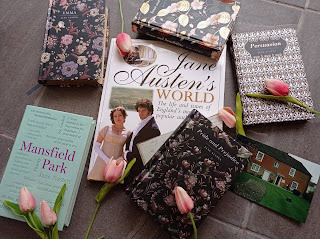
For this Valentine's Day, I decided to think beyond the famous Jane Austen couples we know and love so well. She also devised several marriages which we suspect might crash and burn. Some are potentially big mistakes. Others are jaw-dropping surprises, some of which were entered into with murky motives on at least one side. Here is my list of newlywed couples whose marriages I sincerely hope can go the distance, although other readers may have their doubts. But I wish happily ever afters for each of the following pairs.
Robert Ferrars and Lucy Steele
This pair of impulsive pains in the neck stun everyone with their sudden nuptials. Vulgar Lucy is the girl who threw a wrench in poor Elinor Dashwood's hopes and dreams. She'd formed a childhood pact with Edward Ferrars, the love of Elinor's life, and clung to it like a barnacle, knowing full well he'd outgrown it, and that she herself didn't really care for him as she should. But until a better offer comes along, she refuses to release him. Robert is Edward's smug younger brother and their mother's pet. He knows Edward was disowned for his engagement to Lucy, but is confident enough in their mother's favouritism to trust that he won't suffer the same fate, or at least not for long. Even though Austen hints that they're already beginning to tire of each other by the end of Sense and Sensibility, I hope they'll muddle through somehow, for everyone else's sake. For as long as they're tied up annoying each other, they'll annoy nobody else.
William Walter Elliot and Mrs Penelope Clay
Sure, Mr Elliot is an unscrupulous opportunist whose heart has been said to be as black as the night. But for Mrs Clay's sake, I hope he'll settle down to make a reasonably sound husband. She never comes across to me as the bad person Anne and Lady Russell make her out to be. Sure, she's a social climber and sycophant who hoped to worm her way into Sir Walter Elliot's affections, but when we consider the callous era in which she lived, can we really blame her? Plain, friendless widows such as Mrs Clay found themselves starving on the streets unless they could find others willing to look after them. Anne's harsh attitude toward Mrs Clay always disappointed me, for it's none of her business who her father re-marries, and at his age, surely he has the right to please himself anyway! I like to imagine this marriage of convenience between the younger Mr Elliot and Mrs Clay softening into a friendship. It would surely temper Mr Elliot's hypocrisy should that happen, which would benefit everyone he knows.
Louisa Musgrove and Captain James Benwick
This relationship is a true attraction of opposites. Before her accident on the shore of Lyme Regis, Louisa was a brash, energetic and extroverted young woman. Captain Benwick is a sensitive and emotional introvert struggling to recover from the death of his former sweetheart. Their surprise attraction also releases both Anne Elliot and Captain Wentworth from the unwanted attention of either one of them. It's highly desirable all round, and I would have loved to see Louisa and Benwick together in the story. It's lovely to think that Benwick's poetic influence is already bringing a more thoughtful and reflective side out of Louisa, and I'm sure her sunny nature will also temper his melancholic side. Go Louisa and Benwick!
Charlotte Lucas and Mr William Collins
Poor pragmatic Charlotte goes into this farce of a marriage with her eyes open. She thinks her husband-to-be is pompous and tiresome (which he is)! But she's weighed the pros and cons and decided that a rare opportunity for financial security, motherhood and social approval will be worth putting up with him for. She's already in her late twenties with no interest from other men, so the only alternative is being a lifelong drain on her parents and brothers. Mr Collins considers himself a great catch, but he'll soon be disillusioned, for she can't maintain her brave act forever. Already she's arranging their household to keep him far from her sight. Call me sentimental, but this is the sort of arrangement I like to see change for the better. The remainder of their lives is a long time, and it would be a relief for these two to warm to each other with the passing years. (In Janice Hadlow's book The Other Bennet Sister, this is just what happens.) If Charlotte can help make her husband even a smidgen less ridiculous to the world at large, many people will thank her.
Harriet Smith and Robert Martin
The meddlesome Emma Woodhouse tries her best to deflect young Harriet's attention away from the humble farmer who loves her dearly, and Harriet is so pliable that she almost succeeds. Not only is Emma's choice for Harriet, Mr Elton, a deplorable idea, but it seems Harriet has burned her bridges when she refuses Robert's proposal. Accepting the second marriage proposal from this cool and modest young farmer off her own bat is the first decisive move this girl ever makes. It's also the first time she doesn't consult anyone else. Hopefully it marks the start of a long and happy relationship. I always suspected Harriet's wishy-washy temperament might stem from her long history of living in institutions. You don't get to be pin-up girl at a school like Mrs Goddard's by expressing a mind of your own. I get cross when Mr Knightley says that a blank slate like Harriet needs a good man like Robert to help shape her opinions. No, what she needs is encouragement to think for herself. From the little we see of Robert, I think he'll be the sort of guy to encourage her to excavate her own opinions.
Frank Churchill and Jane Fairfax
I know many readers consider this match to be a total train wreck, for how can such a sensible, down-to-earth, hard-working young woman possibly fall for such a shallow, flippant, immature fop? Doesn't she deserve far better? Emma Woodhouse is speaking truth when she says, 'The fortune is all on his side and the virtue is all on hers.' Still, I can't help hoping Frank and Jane will suit each other excellently in the long run. Frank's toughest critics tend to overlook the fact that he's been pampered by wealthy guardians from boyhood, he's chafing because his autocratic aunt has been so demanding, and he's still in his early twenties; young enough not to be set in his ways. Who better to teach him sensitivity toward those less fortunate than a wife who has endured hard times herself? In return, his cheerful, jocular disposition is already adding an overdue dash of lightheartedness to her days. And marriage to him will enable her to support her dependent elderly relatives without having to eke out a pittance ever again. Sounds like a fair enough trade-off to me.
Lydia Bennet and George Wickham
Whoa, these two may be the ultimate troublemakers, and readers far and wide probably regard their marriage as a ticking time bomb. They go their own merry way, causing friends and relatives huge embarrassment and financial distress. This quality of selfishness and indiscretion isn't the type renowned for sticking together through thick and thin. But, I hope Lydia and Wickham do stick it out, just to prove to their critics that they can! If Darcy shakes his head, thinking he's poured money into a lost cause, I hope Wickham will give him a pleasant surprise. And when the elder Bennet sisters roll their eyes and mumble about that willful, naughty Lydia, I hope she'll prove to them that her marriage will be as happy as theirs. For if there's one thing I love, it's naysayers being proven wrong. I doubt Lydia's and Wickham's will ever be a marriage marked with deep and meaningful conversation, but that doesn't mean they can't be happy in their own way, painting the town together.
So there we have it. Are there any couples on this list who have your best wishes too? Also, if you can think of any others, please mention them in the comments.
And happy Valentine's Day!
February 6, 2022
'Pinocchio' by Carlo Collodi
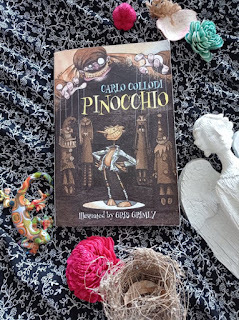
A classic tale of mischance and mischief.
A naughty wooden puppet gets into trouble, disobeys his father, forgets his pomises, and skips through life looking for fun. Just like a "real boy." Until he learns that to become truly real, he must open his heart and think of others.
MY THOUGHTS:
I'm on a roll with my reading of old kids' classics. Carlo Collodi's original tale of Pinocchio is said to be 'picaresque.' I admit I had to look that one up, and discovered it refers to an episodic style of fiction which deals with the adventures of a rough and dishonest, yet appealing hero. Ah well, our wooden boy always seeks immediate gratification, even though that's not how the world works. He's both naive and stubborn. He's easily led astray by other unscrupulous rascals. And he can be very thoughtless, such as when he sells a hard-earned spelling book purchased by his father to pay his fare into a travelling show. He fits the bill of anti-hero indeed.
Pinocchio turns out to be both the unluckiest and luckiest puppet to be found anywhere. He's unlucky because some of his adventures are truly the stuff nightmares are made of! Believe me! Yet he's lucky because somehow, he keeps managing to slip out of these horrendous predicaments.
I picked this old kids' classic off the shelf not knowing whether I'd enjoy it or not. Sadly, unlike other gems such as Charlotte's Web, I give it the thumbs down overall.
Firstly, this original story is not the sanitised version Walt Disney made of it, but far more dark, unsavoury and disturbing. Instead of an essentially innocent little puppet with cute, finely-chiselled features, the original Pinocchio is more crudely formed and sometimes violently reactive. For example, there is a talking cricket, but his name is not Jiminy. He's just a well-meaning insect who starts giving Pinocchio some advice and gets squished against the wall with a hammer for his pains! Yes, Pinocchio tends to be that sort of act-now-and-think-later guy. But what I object to even more is the hidden agenda permeating the plot.
It's hard to see much charm in a load of Industrial Revolution/Protestant work ethic propaganda written to keep kids toeing the line. Over and again the same theme is hammered into us readers; the value of hard work. It's either shown scarily through graphic incidents in the story or stated outright through the voices of moralistic mentor characters. Then just in case we still haven't got it, it's shown and told to us yet again. Sober and responsible wins the day while lazy and disobedient lands you in all sorts of hot water.
Modern messages such as figuring out how to work smarter rather than harder were way in the future. It seems to be written especially to keep the masses of blue collar workers in their place. And cutting through all the quirkiness is a grim and unforgiving tone. Although making mistakes is an inevitable part of growing up, you wouldn't believe it to read this book. Poor Pinocchio has long stretches of working very hard and earnestly, yet every momentary lapse into seeking fun or shirking his dour duty is severely paid out.
Circumstances force him to wear the consequences of his weaknesses and transgressions for all to see and shame. He tells a few lies and his nose grows longer. He joins some friends at a funloving commune, and first their ears become pointed donkey ears, and then they turn into donkeys outright! The awful karma stuff gets a bit much. At one point Pinocchio reflects, 'Ever since I've been in the world, I've never had a happy quarter of an hour.' I found that very poignant, because it seems to me his dogmatising author wished to keep it that way.
Even Pinocchio's happy ending is all to do with conforming to be just like everybody else. From the very start, he hates the limitations of being a puppet and dreams of becoming a real, flesh and blood boy like those he attends school with. We're meant to rejoice with him when his fondest dream finally becomes a reality, and he presumably gets to join the line of poor plebs like his father Geppetto, either starving in silence or working their fingers to the bone for a crust. If I'd been a friend of Pinocchio's, I would have kept reminding him that real little boys are a dime a dozen, but a talking, eating, emotional puppet made from a sentient block of wood is something really rare and special. If you're looking to inspire your kids with a book about cherishing their own uniqueness, this is not it.
Still, the incidents can be vaguely fun to read just to see the stereotypical, typecast badness of the villains who show up. Take the supposedly lame fox and blind cat who suck Pinocchio in, seducing him with tales of the fake Field of Miracles because they want to rob him. Pinocchio falls for their too-good-to-be-true tales with characteristic naivety, but Collodi challenges readers to be wiser, just because of who they are. A fox and a cat. Hmm, you wouldn't expect these guys to possibly be a bit crafty and predatory now, would you?
I'll finish with this amusing advert enticing fools to the Land of Boobies which hundreds of lazy boys aged between 8 and 12 couldn't possibly resist. 'On Thursdays there is never school, and every week consists of six Thursdays and one Sunday. Only think, the autumn holidays begin on the first of January and finish on the last day of December.'
Heavy handed, but hey, that still appeals to me. Sounds almost worth becoming a donkey.
Bottom line: The character Pinocchio is likeable but the story Pinocchio not so much.
🌟🌟½
January 27, 2022
Trixie Belden Series 1 - 3
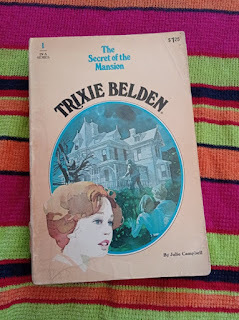
This is the year in which I re-read this beloved, nostalgic mystery series from my past to see how they hold up. Please join me if you have them on hand. I plan to share three books on the last Friday of each month.
1) The Secret of the Mansion
Here's the little book that set the huge ball rolling. It's summer holidays and Trixie is feeling frustrated and lonely because her two older brothers are away at camp. But then their miserly old neighbour, Mr Frayne collapses and is rushed to hospital. There are rumours that he's hidden a fortune somewhere inside his atrociously run-down house. At the same time, the Manor House on the other side is finally occupied by a wealthy family with a daughter Trixie's age. The girls strike up an instant friendship, even though Honey Wheeler seems a bit faint-hearted to Trixie. They stumble across a red-haired boy named Jim, who claims to be Mr Frayne's sole heir. Jim has run away from his cruel and unscrupulous stepfather, who would love to get his hands on any dough lying around. Trixie and Honey resolve to help Jim acquire what is rightfully his.
* The setting, along the Hudson River in New York state, is well established from the get-go. The Belden family lives two miles out of Sleepyside village at Crabapple Farm, the only cosy, modest household in a cluster of three. The other two are mansions; one being the grand Manor House, recently bought by Matthew Wheeler the millionaire, and the other being Ten Acres, the run down home of elderly Mr Frayne. The nearest large town seems to be White Plains.
* Trixie is a lovable, what-you-see-is-what-you-get type of girl, but it's soon clear her weaknesses include impulsiveness and overconfidence. She's game to try daring feats with total confidence that she'll pull them off perfectly first time. She also has a way of accidentally offending people with her straightforward approach.
* Her little brother Bobby comes across as demanding and a bit spoilt. Everyone loves him to pieces but hangs out for other family members take their turns amusing him. It's easy to see why. Who wants to bother reading Peter Rabbit fifty times? His family seem to follow the path of least resistance and cave in to his demands rather than standing up for themselves and calling the shots occasionally.
* It seems to me their parents put a heck of a lot of responsibility on 13-year-old Trixie's shoulders. It's school holidays, yet she babysits Bobby, cares for chickens and spends hours helping tend the veggie garden in drought conditions. Fair enough, they're helping her earn money to buy a horse, and when her two older brothers are home, they divvy the load between them. But still, what a responsible young lady!
* Don't get me wrong, I like Mr and Mrs Belden. They're very cool parents who actually develop rounded characters of their own.
* Honey is as sweet as her name. Wistful, tactful and always intuitively figuring out how others feel. That's more than enough to make up for her anxious streak.
* Jim is the sort of determined boy whose hard luck, David Copperfield style story wins him the devotion of the target audience. To this day when reminiscing about the series, several middle aged friends say, 'I had such a crush on Jim.' He's a nice guy, even under stress, if a bit gruff at times.
* There are mixed messages about the Beldens' religious affiliations. On the one hand, they don't appear to be a church-going family, since Trixie always cycles to Mr Lytell's general store to pick up the newspapers from New York on Sunday mornings. Yet Mrs Belden listens to Bobby say his prayers each night, when he sometimes blurts out 'secrets' to God, such as what Trixie bought her for Christmas.
* We're told the Belden family struggle to make ends meet, since their father's salary earned from working in a bank must spread to cover the pending demands of college tuition for four kids. Yet it seems they can still afford to have their laundry done outside of home. (We know this because Honey almost collided with a laundry truck turning into the Belden driveway while she was learning to ride a bike. Perhaps the driver was looking for Manor House and accidentally made a wrong turn. After all, the Wheelers had just moved in down the road.)
* We get some good background on a few staff members at the Manor House who will turn out to be key recurring characters. Regan the groom is a friendly, easy-going guy with a murky past as a runaway orphan in his teens. And Miss Trask, the neat, grey-haired governess was once Honey's math teacher, and accepted the new position after they established a bond together. It's suits her because the higher salary can help her care for her invalid sister.
* I'm pleased that there aren't many descriptions that can date the story too badly. The kids all run around in generic T-shirts and jeans, while Mr Belden drives a simple station wagon. No popular contemporary music or revealing brand names are mentioned. Sure, they use a landline telephone and it's set clearly before the days of internet. Perhaps this could occur anywhere between its original publication date of 1948 to the mid 1990s. My gut feeling tells me late seventies to mid eighties is a good fit.
* Sadly, I wouldn't really consider this one an ideal mystery story. Trixie, Honey and Jim don't really solve anything by deduction, but rather have a tendency to barrel into significant revelations by total accident. I know from my past enjoyment that this doesn't set a precedent for the rest of the series, but if this was my first reading, I might be a bit worried.
* And what's with the snarling yellow dog? I thought he'd turn out to have a far more significant role and was saddened by his fate in this book.
* Yet on the whole, so far so good. Thumbs up.
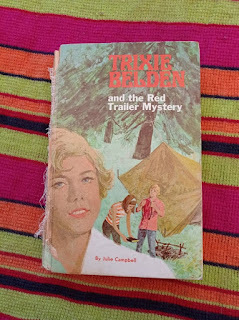
2) The Red Trailer Mystery
This story picks up directly where The Secret of the Mansion finishes. Trixie and Honey are off to look for Jim, who has taken off unaware that he is now heir to a fortune of half a million. They decide to seek him first at some of the boys' camps where he planned to enquire about work opportunities. Miss Trask is their willing driver, and they take the Wheelers' luxury silver trailer to sleep in. (As an Aussie, I know them better as 'caravans'.) An evasive, ragged family seem to own the luxurious red trailer parked next to them at the first stop-off point. Their hangdog demeanor doesn't seem to match their flash vehicle, and they certainly aren't in holiday mode. What's more, the girls discover there are crooks in the area, stealing trailers, stripping their contents for the black market, then abandoning them. Can the weird family have anything to do with the racket? And most importantly, how will Trixie and Honey find Jim?
* I love the rural, upstate New York setting. It reminds me of National Park areas and caravan parks where I live. A good story makes the world seem smaller.
* The first book makes it sound as if the state was suffering drought conditions and people's dams and tanks were struggling to muster a trickle. Yet in this story, torrential downpours occur just a matter of a few days later. I'm happy to roll with that, but funny nobody mentioned what a welcome relief the change was.
* Taking two dogs along strikes me as such a bad idea. Reddy and Bud cause havoc, and the fact that they're allowed to roam freely through the area dates this book for me. In modern times, pets can't run rife through environmentally protected areas. And rightfully so! They're no longer even allowed at most decent caravan parks. Trixie and Honey are arguably pests too, for insisting that these nuisances come along.
* Riding in the trailer while it's moving also dates the story. That's strictly illegal now. Also, I'm amazed how many car and trailer owners walk off and leave their keys in the ignition, practically inviting thieves to steal them. What a blast from the past. Were people really ever so trusting of their fellow men?
* We get to meet the first extended family member who appears throughout the series. It's Honey's cousin, Ben Riker, who is staying at one of the camps for part of the holidays. He's a practical joker and can be a pain in the neck, judging from the reminiscences about their shared childhood at their grandmother's.
* Jeff, the careless and malicious waiter at the park headquarters gave me a few laughs.
* We get the first mention of the Lynch family, but revealing why would be a spoiler for this book.
* Honey finally gets her adopted older brother, who coincidentally looks a lot like her red-haired father. How cool is that! Yet having said 'finally', the action of Books 1 and 2 takes little over a week in total.
* Trixie mentions in passing an old tenant house on Honey's property at home. Heads up, this will be an important factor in the third mystery.
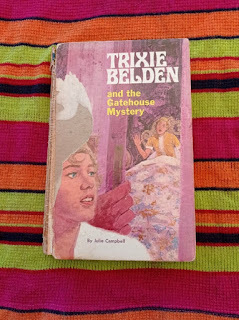
3) The Gatehouse Mystery
Trixie, Honey and little Bobby set off to explore the old gatehouse where visitors in carriages were welcomed to the Manor House in days long past. Bobby trips over and cuts his knee on a sharp, glassy looking stone which Honey identifies as a stunning diamond. Trixie convinces her not to hand it over to her parents immediately, as she wants a crack at solving the mystery of how it got there. That decision attracts jewel thieves on the girls' tails instantly, especially when an eavesdropper overhears exactly what they've done with it. Meanwhile, Trixie's brothers Brian and Mart arrive home from camp at last, and make great friends with Jim and Honey, like Trixie before them. Together, the five of them attempt to solve the diamond mystery and also form a club, the Bob Whites of the Glen.
* Brian and Mart at last, hooray!!! The fun and wisecrack level soars to a new high when these two arrive home. I always remember all the banter with as much nostalgia as the mysteries themselves.
* We find out Regan is only 22! Virtually a kid himself in my books. To think I used to relegate him to the world of staid of old adults. He comes across at least ten years older.
* Trixie and Mart are regarded as 'twins' for the month of May, since he was only 11 months old when she was born. Her birthday is May 1st and his is June 1st. That's worth mentioning in case it comes useful for records.
* The Wheelers keep a large staff, including a cook, a laundress, three maids, Regan, Miss Trask, a new gardener named Nailor and a new chaffeur named Dick. This time around, their pomp amazes me, since they have members of staff actually wait on them at dinner time. A cook I can understand, but isn't this taking it a bit far? Come on guys, get over yourselves! You're just wealthy, not royalty or nineteenth-century gentry. Surely you can plate up for yourselves.
* Although we haven't seen much of Honey's mother yet, whenever we do see or hear of her, she strikes me as a pampered princess. I prefer Mrs Belden's style by far.
* It's fascinating how Jim proves that two different people's impressions may vastly differ. When they first see Dick the new chaffeur, Trixie sums him up as weaselly looking while Honey thinks he's quite attractive. They consider the shade of his car different colours too. We shouldn't ever assume the person next to us is taking in the same scene we are.
* Mart remarks that he has no idea why pickpockets are referred to as 'dips'. Come on Mart, a smart boy like you should be intuitive enough to figure out that it's because they dip their fingers into other people's pockets.
* Miss Trask enjoys watching the wrestling on TV! I'm afraid that makes me laugh. It's very easy to believe that Regan is such a fan he'd be glued to the screen. But Miss Trask! It takes a huge stretch of the imagination.
* This final observation probably shows my age. Trixie had no right to hold on to that diamond for a single minute. She was being very naughty and waaaay overstepping herself. Honey and the boys became culpable for agreeing to go along with her. I'm especially surprised at Jim. If they'd handed it straight to the police as they should have, it would have made its way straight back to the lady who owned it, and a lot of shady drama at the Manor House would have been avoided. However, perhaps the crooks wouldn't have been caught, or at least not as quickly. That's surely how Trixie's staunchest fans would defend her.
* Okay, this is actually my last observation. My favourite line in the book comes from Regan. It occurs soon after he scolds Trixie for withholding the diamond. Brian comments that their father will be mad at all of them. Then Regan asks, 'How do your parents stand you kids, anyway?' I guess he'll have the opportunity to ask that question many more times to come.
Whew, that was great fun. These dudes have had three mysteries already, all within the final weeks of their summer holidays. Please join me at the end of next month for the next three books in the series. Full marks for pure enjoyment and great memories so far.
January 20, 2022
Great Survival Stories (and why we love them)
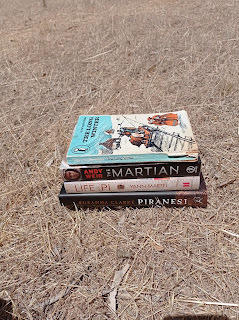
Who can resist stories with characters in desperate situations? Whether or not we consider ourselves fans of survival stories in general, we're bound to have read a few. They make compelling page-turners because they feature one or two brave souls who face seemingly impossible odds against nature. Although we'd hate to be in their shoes for real, we're happy enough to place ourselves in their mindsets for as long as we're reading.
Several of my choices feature just one key character alone against the elements. Perhaps that appeals to the introvert side of my nature. Or perhaps there's nothing quite as satisfying as cheering for an intrepid underdog, and who could be more deserving than a loner who prevails against the pitiless elements?
1) Robinson Crusoe
I had to read this classic for Uni and found it exceedingly dull, to be honest. Yet Daniel Defoe's famous hero has made his stamp on our western cultural consciousness for generations. He's the quintessential Brit who cannot be subdued by decades on a desert island. Crusoe adapts to what's around him but retains the faith and proud nationalistic spirit he was born with. By modern standards, his imperial attitude of superiority and dominance isn't the most admirable characteristic. But boy, did it work for our friend Robinson!
2) The Martian
The brilliant and creative astronaut Mark Watney is accidentally stranded on Mars where his crew mates leave him for dead, but manages to keep himself alive with basically nothing but his own desperation and ingenuity. I guess he can thank his seed potatoes, botanical background, self-fertilising toilet habits and seemingly never-ending roll of duct tape. Most of all, Mark proves that an offbeat sense of humour is a strong survival tool. His attitude is always, 'This new development is very bad, and I have no idea what I'll do yet, but I'll think of something or I'm history!' (My review is here.)
3) Life of Pi
Piscine Molitor Patel is a resourceful teenager who not only finds himself stranded in a lifeboat on the vast Pacific Ocean but shares it with a group of zoo animals including Richard Parker, a fierce Bengal Tiger. Pi has to assert himself as the dominant animal on the boat or die. In short, this high school boy must embody the superiority of the human spirit just to stay alive. (See my review.)
4) Piranesi
Not only does this young man have a whopping case of amnesia but he lives in a mansion full of statues and rising tides with the potential to drown or starve him any time. Our boy figures out how to develop his fishing and record keeping skills, and this takes all his time so he can't despair. And it sure helps when he chooses to think of the House as a friendly setting he's cooperating with rather than an enemy he's fighting against. (I've raved about it here.)
5) The Long Winter
There were six members of the Ingalls family in this true story, but they made one unbeatable family unit. These guys were stuck in an isolated town buffeted by blizzards. They were slowly freezing and starving, because the supply train couldn't push through until spring. Electricity to houses was way in the future, so they had to improvise ways to produce heat and food out of practically nothing for month after month, surprising themselves by their ingenuity with buttons and straw. (I've written more about this compelling true story here.)
Whew, now that I think of it, what a great stack to read back to back. If you had to choose just one setting to be dropped into, which would it be? Scorching desert, barren red planet, daunting ocean, frozen snow plain or weird house? I think if I had to choose, I'd join Piranesi in the neverending series of halls with all the statues. Even though it's a horrifying prospect, something about it appeals to me.
Have you any favourites you could add to my list?
January 13, 2022
'The Lincoln Highway' by Amor Towles
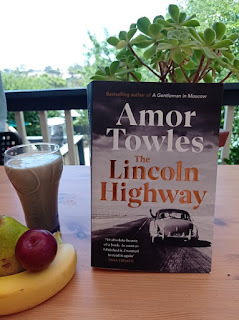
The bestselling author of A Gentleman in Moscow and Rules of Civility and master of absorbing, sophisticated fiction returns with a stylish and propulsive novel set in 1950s America
In June, 1954, eighteen-year-old Emmett Watson is driven home to Nebraska by the warden of the work farm where he has just served a year for involuntary manslaughter. His mother long gone, his father recently deceased, and the family farm foreclosed upon by the bank, Emmett’s intention is to pick up his eight-year-old brother and head west where they can start their lives anew. But when the warden drives away, Emmett discovers that two friends from the work farm have hidden themselves in the trunk of the warden’s car. Together, they have hatched an altogether different plan for Emmett’s future.
Spanning just ten days and told from multiple points of view, Towles’s third novel will satisfy fans of his multi-layered literary styling while providing them an array of new and richly imagined settings, characters, and themes.
MY THOUGHTS:
This is my first book finished this year. I wrapped it for myself and put it beneath the Christmas tree, having enjoyed A Gentleman in Moscow so much. At first I assumed Amor Towles was going to reverse his scope from close confinement in one building to an expansive road trip. The title turns out to be a smidgen misleading, since this is less of an actual travel tale and more about the snags and shenanigans which interrupt characters from potential road trips they intend to take. Lots of the action takes place in New York city.
It's about three 18-year-old men who became friends within a juvenile work farm where they were all serving time. Emmett Watson is on his way home to Nebraska. He'd been sentenced for unintentional man slaughter, and while there his father dies, leaving him the sole guardian of his 8-year-old brother, Billy. The bank has repossessed the family home, and the brothers now intend to start a new life west in California. However, it turns out Emmett's two mates, Duchess and Woolly, stowed away in the warden's car, and they intend to go east to New York. Although he sensibly plans to part from them ASAP, wily Duchess has his devious ways of making sure that doesn't happen.
The characterisation is excellent. In contrast to Emmett's earnest, grounded determination to be a quiet, hardworking citizen for the sake of his little brother, his two friends are completely different personalities. Woolly is a gentle, lost soul who drifts through life at a slower pace than others, easily overwhelmed by life's details. Yet his observations sometimes plumb depths the multi-tasking masses overlook. And energetic, disarming Duchess is a street-smart, manipulative charmer with rigid notions about pay-backs and retribution. He's the sort of guy who desperately needs a true friend, yet hopelessly complicates the lives of whoever he grows close to. Distancing oneself from him always seems by far the wisest choice, yet he's so charismatic, that's far easier said than done.
Shifting perspectives enable plenty of cliffhangers at the ends of chapters and sections. I read an interview with Amor Towles, who revealed his original intention to share all the scenes between Emmett and Duchess alone, yet several other voices insisted on having a say too. I'm glad of that, because without Woolly's thoughtful, eccentric observations, it would be a way less quirky book. And sure, the additions of voices such as Ulysses and Pastor John make the whole book more far-fetched and less credible as a whole, yet is that such a bad thing? They arguably make it more Dickensian and lyrical. It's the sort of book for suspending disbelief and going with the flow.
I can't help wondering why Towles chose to use third person perspective for Emmett and first person for Duchess. Does he intend for readers to feel more closely connected to that impossibly presumptuous ratbag? I'm guessing many people do and it's easy to understand why. You'd have to be pretty hardhearted not to warm to him when you discover his backstory. I found myself liking Duchess more with each page I turned, even though his sheer cheek often astounded me. Yet young men with kind hearts and sound principles always appeal to me, for which reason Emmett never stopped being my favourite of the boys.
He's not necessarily my favourite character altogether though. To me, the most awesome character is Sally, Emmett's next door neighbour. She's a strong-spirited young woman, firm in her conviction to use kindness and common sense as her compasses, no matter how crazy the world seems to grow. Her father calls her wilful, a nurser of furies, contrary and prone to speak her mind. He means all that as a pointed put-down but she takes it as a compliment. Sally's feisty presence lifts the quality of every scene she's in, and she's in far too few. My favourite chapter of the whole book is a personal reflection in which she defends her feminine household arts when she suspects the boys tend to blow them off. It's precisely because they're old-fashioned, time-consuming and unnecessary that she does them.
The ending is abrupt and shocking. It winds up one part of the plot perfectly with some brutal poetic justice, yet I still can't help demanding, 'Is this really all we get?' Some seemingly important loose ends are left waving in the wind, including the strong purpose behind the Watson brothers' joint decision to choose California as their ultimate destination. Even more frustrating, a certain person gets to escape the 'unfinished business' that seemed to be pursuing him all through the story. I realise I'd been hanging out for that encounter, so it's the hardest rub which makes me long for a loophole. Must we accept that last page with absolute finality? If only there's a little room for ambiguity, I'll take it.
Overall, I think the story is all about the complications of getting involved with other people's messes, inviting us to consider the extent to which the threads of different people's stories converge and blend into one. It's sprawling, ungainly, tangential and all over the place, but always strangely compelling. Laughter comes often, and I never even got started on the endearing, innocent genius of young Billy. I found it a perfect read for that lazy final week of the year beginning with Boxing Day, and would recommend it to anyone who's interested in reading it.
But although I can forgive the bizarrely far-fetched moments, I can't really forgive and forget the frustration of those loose ends! In fact I'd go so far as to say that Towles has let his readers down by letting these threads peter out, when he'd gained our interest so strongly and seemed to intimate they'd be main plot points. It's enough to remove a whole star from what might have been my final ranking.
🌟🌟🌟🌟
January 6, 2022
'Pride and Prejudice' by Jane Austen
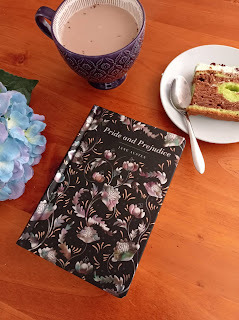
Since its immediate success in 1813, Pride and Prejudice has remained one of the most popular novels in the English language. Jane Austen called this brilliant work "her own darling child" and its vivacious heroine, Elizabeth Bennet, "as delightful a creature as ever appeared in print." The romantic clash between the opinionated Elizabeth and her proud beau, Mr. Darcy, is a splendid performance of civilized sparring. And Jane Austen's radiant wit sparkles as her characters dance a delicate quadrille of flirtation and intrigue, making this book the most superb comedy of manners of Regency England.
MY THOUGHTS:
Warning: A few mild spoilers, but I consider old classics to be fair game. And who isn't thoroughly familiar with this timeless classic anyway?
For many years I was prejudiced against Pride and Prejudice, because of its iconic reputation which I wasn't convinced smart-alecky but short-sighted Lizzy Bennet and arrogant Mr Fitzwilliam Darcy really deserved. Back in my early teens, I summed Darcy up as a nasty piece of work for alienating everyone at that first local ball by his bad manners. When he delivered his famous line (tolerable but not pretty enough to suit me) any sympathy I might have had for him was completely lost. And the screen version did nothing to help the story's cause in my youthful eyes. I remember being disillusioned by the lascivious way other females reacted to the sight of Colin Firth emerging from the lake in his white shirt. ('I mean, come on girls, we shouldn't complain about being wolf-whistled and sexually objectified, if we're going to do the exact same thing!') Altogether, it was enough to make me decide, 'Nope, I don't like Pride and Prejudice. Never will.'
I've read it a few times since, of course, and boosted my opinion a little each time. So having reviewed each of the other five Austen classics, it was time to tackle it yet again, which I had great fun doing in the weeks leading up to Christmas. I decided to give it a fair appraisal, as if I'd never read it before. But I seriously wasn't prepared for all the impressive subtleties I don't remember noticing in past readings.
To start with, a vulnerable side of Darcy emerged this time which I'd never considered before. Perhaps during the intervening years I've gained more knowledge about true introversion and recognise him as a member of my tribe. Yet it's still easy to understand, especially with his vast fortune and good looks, how his natural reserve could be mistaken for arrogance and pride.
I experimented with re-reads of several dialogue-driven scenes Darcy is part of. When we read them with the mindset that he's a haughty snob, there's plenty of apparent evidence to support that opinion. Yet when we read them with an awareness that brain fog and social freeze are real things, it's far easier to cut him slack. The same slabs of dialogue yield completely different conclusions, depending on our impressions of Darcy. And indeed, Elizabeth reverses her opinion of him when she comes to know him better.
It's really carefully crafted writing from Jane Austen, since we're able to read it either of two ways. Every line such as, 'I certainly lack the talent which some people possess of conversing easily with those I have never seen before,' is a clue to the real man. He's not really a snooty elitist, but just an awkward wallflower who blurts out something entirely stupid and unsuitable on the spur of the moment which he never intended her to overhear. And that verdict makes him far more lovable.
I love Elizabeth's own feasting on humble pie. It's the moment after reading Darcy's letter to her describing his background with Wickham. She realises that in spite of giving herself credit for clear judgment and penetration, she has in fact responded to two guys (Darcy and Wickham) based on her personal experience of how flattered or snubbed they made her feel. 'How despicably I have acted,' she reflects, yet it's a mistake any of us could make. There's nothing quite like a grand moment of self-revelation in a story, since many people live their whole lives without one.
Elizabeth is actually a very fair-minded person. Her cynical father gains a lot of sympathy from readers for rushing in and marrying a pretty airhead, and then having to live with the consequences. But throughout the story, Lizzy comes to realise that it's been hard on her mother too, living with a sarcastic grouch who makes his indifference clear by always withdrawing to his library. In fact he 'exposed his wife to the contempt of her own children' which is 'highly reprehensible.' I appreciate Lizzy's well-balanced appraisal here.
Apart from the complex main pair, there are so many other unforgettable characters too. The 'nice guys' Bingley and Wickham; one genuine and the other hypocritical and slanderous. Parasitic Mr Collins, with all his servility and self-importance rolled into one. Lady Catherine de Bourgh, the autocratic old tree whose sap he'll keep sucking, because he knows as long as he flatters, she'll keep nourishing. The pragmatic Charlotte Lucas, who considers a ridiculous husband a fair sacrifice for security and social standing. The ultimate catty, mean girl, Caroline Bingley. (What a 'rhymes-with-witch'!) And the shallow and reactive Mrs Bennet, and her equally boy-crazy, fashion obsessed youngest daughter Lydia. What a fantastic cast!
This time round, I can't help really liking Jane. Brushing her off as Lizzy's naive, less penetrating and therefore vulnerable older sister does her an injustice. Jane isn't blind to people's faults and shady motives. She just chooses to give others the benefit of the doubt for her own peace of mind. On the whole, choosing to think well of people isn't a cop-out, but a tranquil and sound way to live, because it takes far less energy than maintaining a mental resentment list. It's Jane's secret weapon, just as Lizzy's is humour and discernment. For example, Jane is the only person willing to think the best of Darcy after Wickham has spread his malicious tale around, and it turns out she's right to do so. Steady and kind wins the day. Anyone can benefit from a friend like Jane.
I'd forgotten some of the brilliant social comedy in the book! I love it that Elizabeth is busy rehearsing every reason why she hates Darcy the very moment before he enters and makes her his first atrocious proposal. And how Lady Catherine later gives her nephew a ray of hope while she thinks she's actually stamping out the final embers of his misplaced affection. Then there's Mr Collins' abysmal letters to Mr Bennet! And the fact that Mrs Bennet, unaware of Darcy's magnanimous gesture, is perfectly chill with the idea that her brother Mr Gardiner should fork out big money from his own pocket to cover the indiscretions of her daughter, Lydia. Every single page is highly entertaining.
Since I decided Pride and Prejudice may be overrated compared to Austen's other classics, I aimed to choose another one as a personal favourite instead. I left this review till very last, assuming I knew it back to front. But guess what? I've changed my mind, as it now seems this book must always deliver some fresh revelation for each stage of our lives. It deserves all its praise for introducing the 'hate to love' theme long before it was even a trope, and no doubt helped to make it so.
I concede, it is my very favourite Jane Austen novel after all. Like Lizzy and Darcy, I can admit when I was wrong.
🌟🌟🌟🌟🌟
December 30, 2021
What to expect from this blog next year

Another year has sped past, and my commitment to this blog is still burning strong. I'll be studying for a Master in Creative Writing and Communication at Tabor College here in Adelaide next year, which I'm quite excited about, although completing course assignments will have to take priority over blog posts. But I'm pretty confident I can still deliver one post per week all through 2022, especially if I get a run-on during holiday time. At the moment that day fluctuates between Fridays and Mondays. If you've stuck around with me so far, I hope you'll continue, and to give you some of idea of what to expect, I've made these five points for next year.
1) I feel as if I'm on a roll with childhood and young adult classics. They present wisdom in optimistic and encouraging ways, so you can expect to see many more of them. I'm sure we take on board far more in subsequent readings, and that applies especially to kids' lit. If we've read them before, we get to compare our current opinions with those of our junior selves, to gauge how far we've come. As C.S. Lewis said, 'No book is worth reading at the age of ten which is not equally - and often far more - worth reading at the age of fifty and beyond.'
2) I might try to squeeze in one or two more doorstop sized books, or tomes. I always feel proud whenever I get through an 800+ page novel. These are perhaps the book nerd's version of extreme sports such as mountain climbing. Ticking off a behemoth like War & Peace or The Brothers Karamazov or Middlemarch or David Copperfield (all of which I've done) is our equivalent of reaching the Everest summit.
3) There'll be more book lists, although I don't know what they'll be about yet. It's one of the fun things about reading widely. I enjoy those sudden links in my mind which send me running for a pen to figure out whether or not I've identified something that should be a 'thing' rather than far fetched waffle. And many times I still publish the list, for even if it is far fetched waffle, it's still fun.
4) I've recently created separate pages for favourite authors I've read a lot of, and you'll see them high in the right hand toolbar. I figured that since these guys have given me hours of enjoyment and reflection, they deserve pages of their own. So far, these include Charles Dickens, Jane Austen, Lucy Maud Montgomery, Laura Ingalls Wilder, the Bronte sisters and C.S. Lewis. I may add Louisa May Alcott and others down the track.
5) I'll keep adding occasional discussion posts too. They may include reflections about theology and the Christian faith. It's what I've been studying over the past year or two, and it's very interesting.
I shared the photo above on Instagram just before Christmas, with this quote to go with it. 'Of course anyone who truly loves books buys more of them than he or she can hope to read in one fleeting lifetime. A book, resting unopened in its slot on the shelf, full of majestic potential, is the most comforting sort of intellectual wallpaper.' David Quammen.
Although most of those you see on my shelves have been read and loved to have earned their spot, I do buy into his sentiment.
Happy New Year. As always, I hope I can provide many recommendations for books you might never have considered reading, which are destined to become favourites.
December 16, 2021
'The Professor' by Charlotte Bronte
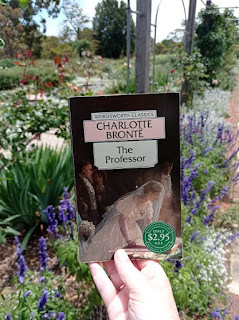
The Professor (1857) is English writer Charlotte Brontë's first novel. Rejected by several publishing houses, Brontë shelved the novel in order to write her masterpiece Jane Eyre (1847). After her death, The Professor was edited by Brontë's widower, Arthur Bell Nichols, who saw that the novel was published posthumously. Based on Brontë's experience as a student and teacher in Brussels--which similarly inspired her novel Villette--The Professor is an underappreciated early work from one of English literature's most important writers.
MY THOUGHTS:
This was the first book Charlotte Bronte ever wrote, although it was published posthumously, when her other masterpieces were already well known. Some critics think it might never have been regarded as fit to publish at all, except that she had made such a name for herself. I see their point, because although her writing is beautiful as ever, the plot and characterisation lack the great heart of Jane Eyre and Villette. The main character, William Crimsworth is a supercilious upstart if ever there was one, and my biggest problem with this book is that Charlotte intended him to be a conscientious, exemplary young hero who deserves our total love and support.
An orphan from babyhood, William shrugs off help from his snooty uncles on his mother's side of the family, instead seeking employment with his brother Edward, who is ten years his senior. At the age of 30, Edward is a wealthy manufacturer who identifies totally with their father's self-made, working class background and ethic. He grudgingly offers William a job as his clerk, all the while despising him because their aristocratic relatives had financed William's education through Eton, and also just because William gets on his nerves. Edward treats William with such atrocious unfairness that William eventually has a gutful and decides that heading across the channel to try his luck in Brussels would surely be no worse than working for his brother. So far, there's nothing not to love, right?
Charlotte Bronte has set our boy up in the perfect lone-underdog position to retain our sympathy all through, but then she unravels her good work with his attitude. Perhaps her big mistake is to write from William's first person perspective, because whenever he reveals his candid impressions, I groan out loud. He gains a teaching position in a boys' school (where they were all called 'professors') and also acquires a few teaching slots at the girls' school next door. From then on we get William's critique of staff and students alike, and nobody stands up to his scrutiny, sometimes for the nitpickiest of reasons.
He's racist, xenophobic, chauvinistic and ageist, dishing out harsh judgment on people's intelligence and physical features. And his outrageous reflections just keep coming. He assesses the figures of his female pupils as if they're cows at a market. Then this 21-year-old newcomer labels others as 'vulgar', 'inferior-looking', 'commonplace' and 'insignificant.' He makes snap negative judgments based on the shape of a girl's head or the cleanliness of her neck. And he is derogatory about their national Catholic faith, often with an eye-rolling, 'well, what would you expect?' sort of attitude. Or else, he struts about giving himself mental pats on the back because Mademoiselle Zoraide Reuter, the director of the girls' school, has found the weak spot of every other member of staff, but can get nothing on him!
I could never excuse his brother for his horrible treatment of William, but it gets to the point where I almost understand why Edward was so irritated with William's mannerisms, accent and way of carrying himself. For if William comes across as a smug little prat to me, it stands to reason that his gruff, no-frills brother probably got the same vibe. And I'm sure that's a conclusion Charlotte Bronte never intended readers to make.
There are a couple of aspects of the book I didn't mind. My favourite character is Yorke Hunsden, the sarcastic Yorkshire neighbour who is always paying William out, but proves himself to be a genuine friend. Hunsden criticises William to his face, yet looks out for his best interests in many very effective ways behind his back. That's refreshing, when so many so-called friends get it the other way around.
The romance element is sort of sweet. William falls for a young lady named Frances Henri who joins his English class, hoping to get a bit more experience with the language, although she's actually a fellow teacher, who instructs the girls in lace mending. I do like the way Frances comes to appreciate the subtle compliment behind William's demanding standards for her bookwork to the extent that he becomes the subject of some of her best pieces.
But plotwise - meh. William finds Mademoiselle Reuter attractive, then overhears her flirting with Monsieur Pelet, with whom she appears to have some understanding. It's hardly even two-timing, since Mademoiselle Reuter had never committed herself to William in any way. But he turns on his chilliest, most disdainful behaviour until she gets the message, then he falls for somebody else who agrees with him that he's absolutely perfect in every way. If William wasn't obnoxious he'd be boring, for who cares to read about a guy in his early twenties whose innate frugality, sound judgment and work ethic never once let him down? I'd be interested to know if any modern readers do, in fact, love this guy. Are there truly any William Crimsworth fans out there? Speak up, because I'd be interested to know.
Overall, these Crimsworth boys are not all that dissimilar really. One is meant to be always on his high horse but the other always looks down his nose too. The two stars are for Charlotte Bronte's beautiful writing style. It's refreshing in a way, to see that even undoubted geniuses have the occasional misses.
🌟🌟
December 9, 2021
The Placebo Effect in Fiction
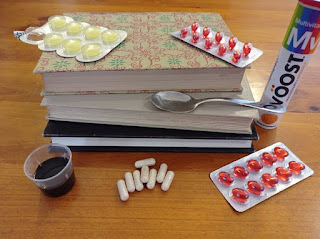
I love a good story that highlights the power of the placebo effect. Here is an internet definition of what takes place. 'The placebo effect occurs when a person's physical or mental health appears to improve after taking a dummy treatment.' In other words, our own brilliant brains are effective enough to implement change for the better when we think a positive development has occurred, even if we are totally mistaken.
Here's a personal anecdote that proved it true to me beyond a doubt. At the MOD Museum in Adelaide, there was once an apparent pain threshold test that sent zaps of electricity through a handle to the palms of our hands. I'm no fan of pain, but challenged by my kids, I thought I'd give it a try. 'Ouch!' The first surge made me yell out and shake my tingling hand.
Then the same handle administered a soothing massage, complete with comforting, smiley emojis on the screen. The accompanying text informed us this was a special numbing effect to reduce the impact of the next zap. That promise was all that convinced me to keep holding on, and sure enough, the next electric shock was milder and easier to take in my stride. I indicated that in my feedback. And finally, more text scrolled down to tell us the supposed numbing effect was all a hoax, and the second electric shock was the exact same magnitude as the first. I, along with many other respondents experienced what they were really testing; the placebo effect.
Well, that cemented my conviction that we should approach this phenomenon with a lot of respect. Whenever I hear stories of spontaneous healing or confidence building after some placebo effect, I'm not a bit surprised. The fascinating placebo effect has made its way into several stories, old and beloved alike. Since fiction is a mirror of the strange truth of reality, the following incidents are deeply encouraging as well as hugely entertaining.
Here are a few I love.
1) Mister Meddle
I appreciate how Enid Blyton indirectly teaches her very youngest fans about the placebo effect. Mister Meddle is staying overnight at a guesthouse with his good friend. (His name escapes me, but it could well have been Jinks.) Meddle thinks the bedroom is horribly stuffy but Jinks feels chilly and argues against opening a window. The pair of them tussle in the darkness and accidentally smash a pane of glass. Meddle is gleeful that the sore point has been resolved in his favour. Jinks can't un-break that window, so Meddle jumps back into bed enjoying refreshing blasts of cool air. It takes the early morning light to reveal what really happened. The window is still closed, but the glass front of a bookcase is splintered. And the grinning Jinks realised that all along. (Next they'll have to argue about who pays the repair bill.)
2) Bless Me, Father series by Neil Boyd
I've barely given these great books a thought since I read them in my teens. Neil Boyd is a young Catholic curate who assists the senior Father Duddleswell. In one incident, they help cure a man who believes he's dying from a witch doctor's curse, and lies languishing in hospital. (The holy duo believe this guy is suffering from the negative counterpart of the placebo effect, which happens to be the nocebo effect. He will indeed die without intervention.) The patient already knows Father Duddleswell, so they dress young Father Neil up as vastly superior spiritual guru than the paltry witch doctor who inflicted the curse. He chants a string of supposed incantations to reverse the curse, and after plenty of solid improvisation, the stunt works. The patient gets out of bed believing himself to be fully cured, and resumes his former active lifestyle.
3) Harry Potter series
One of my favourite incidents takes place in The Half-Blood Prince. Ron Weasley has joined the Gryffindor Quidditch team. Everyone knows he occasionally shares his siblings' talent for the game, but suffers from crippling nerves and often crumples mid-match. Until the day he believes his best friend, Harry, added a few drops of felix felicis, or liquid luck, to his morning pumpkin juice. Ron scorches the court, leaves his Slytherin opponents gasping, and almost single-handedly wins a crucial match for his team. Only then does Harry admit he used no felix felicis at all. Ron's blistering performance was based solely on a wink and a flash of the bottle.
4) The Wonderful Wizard of Oz
L. Frank Baum gives us the all-time perfect incident here. The Scarecrow, Tin Man and Lion long for brains, a kind heart and courage respectively. The little wizard is a complete fake, but he's clever and understands the power of suggestion. All it takes is a hastily scribbled Diploma, a testimonial of great altruism and a medal of bravery to satisfy the cravings of our awesome trio. These physical objects give the dormant traits permission to blossom. In fact, each member of the trio has been using these attributes all along, but only now do they give themselves permission to really own them. (I've reviewed it here.)
If you can think of any more, please let us know in the comments. Several years ago, I wrote this review of a fascinating book called You are the Placebo. It seems that knowing the placebo effect may come into play doesn't stop it working, and may even assist it, if that's what we expect to happen. Perhaps the belief that settling down with a good book, hot drink and purring cat is an excellent antidote to a stressful day may well be a placebo effect, but it's one I'm happy to keep buying into.
Have you any examples of your own?
The Vince Review
I invite you to treat this blog like a book-finder. People often ask the question, "What should I read next?" I've done it myself. I try to read widely, so hopefully you will find something that will strike a chord with you. The impressions that good books make deserve to be shared.
I read contemporary, historical and fantasy genres. You'll find plenty of Christian books, but also some good ones from the wider market. I also read a bit of non-fiction to fill that gap between fiction, when I don't want to get straight on with a new story as the characters of the last are still playing so vividly in my head. ...more
- Paula Vince's profile
- 108 followers



